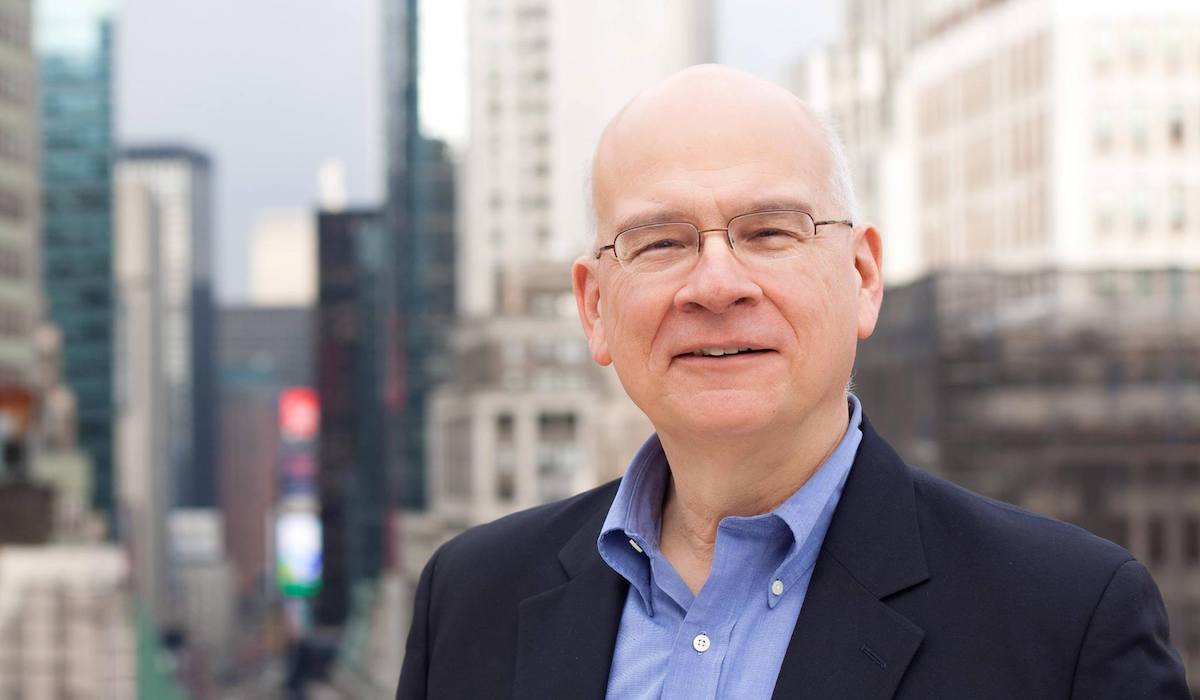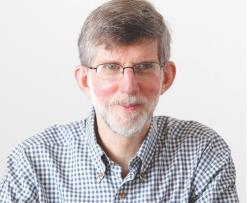I’ve been a Christian for almost half a century, sometimes with a critical spirit toward sermons. So I’ll now write something I’ve never written before and never expect to write again: the best preacher I’ve ever heard “died” last Friday. I’ll refer to Tim Keller in the present tense, though, for two reasons. First, his faith, my faith, and I hope yours speaks of his continued existence, new and improved. Second, while walking my dog I listen three times a week to newly posted Keller sermons from over the decades on the Gospel in Life podcast. His thinking lives on.
I had one-to-one talks with Keller only three times, so I hope you’ll read elsewhere about his influence via friendships. My wife and I did listen in person to his sermons from 2008 to 2011, and at first we did so anxiously. Listening to how he handled difficult Bible passages was like watching a shortstop ranging far to his right on a hard-hit ball: Will he be able to reach it? He has. He’s on the outfield grass: How can he possibly throw out the runner at first? He just did.
We enjoyed and learned to wait for Keller’s “gospel turn” two-thirds or three-fourths of the way in. Wait for it… wait for it … now. The sermons always show how Christ’s sacrifice proves God’s love: “He is so committed to our ultimate happiness that he was willing to plunge into the greatest depths of suffering himself.” They also show the unity of truth and liberty. Nietzsche libeled Christianity, calling it an enslaving religion. Listeners to Keller learn: You may think you’re free, but you’re not. You’ve made yourself a slave to money or sex or a particular body image.
I first tried to box in Keller, like one of the blind men feeling an elephant. I felt a tusk and thought “spear,” a side and thought “wall,” a tail and thought “rope.” Finally, I realized that Keller’s preaching combines all those aspects. His sermons are a spear against complacency: he criticizes those who react to Jesus tepidly, since anyone who understands Christ’s challenge and has intellectual integrity should go all out in following Him. He thrusts against those who look to Christ as an add-on: spruce up the cottage, clean out the gutters, slap on some paint. He asks why we don’t realize that God plans to make the cottage a palace.
Keller’s sermons are also a wall against idolatry. He doesn’t just harp on the easy stuff like statutes of Baal or Asherah pole dances. He talks about good things like work and beauty that we make ultimate. He gives himself as an example of falling victim to idolatry when he tried to become the perfect pastor bearing all burdens and turning down help: “It wasn’t until I began to search my heart with the biblical category of idolatry that I made the horrendous discovery that … I was using people in order to forge my own self-appreciation.”
Keller’s sermons are a rope for people like me who sometimes feel stuck on the ground unless we have a theoretical theodicy, a way of explaining the presence of evil in the world. His sermons point out the problems of good theories, like those based in natural law, that plausibly explain some evil but fall short of explaining all suffering. Keller then proposes that, instead of pretending we know God’s mind, acknowledge we don’t know all of God’s reasons, and throw onto skeptics the burden of proving “God could not possibly have” any reasons for allowing suffering and evil.
The most publicized parts of current evangelicalism feature preachers like banshees screaming for bans of things or people they don’t like. Keller’s sermons, though, display the upside-down gospel. Instead of demanding, “Don’t doubt,” he says, “Doubt doubt.” When someone discounts Christian testimonies by saying people believe only because they’re part of a particular social group, Keller teaches us not to nod and not to get angry. Instead, he teaches us to ask: “Why do you disbelieve? Why shouldn’t we discount your argument?”
The many remembrances of Keller during the past few days remind me of how in Three Amigos, a funny 1986 movie, one particular word puzzles Dusty Bottoms (Chevy Chase): “What does that mean? Infamous?” Ned Nederlander (Martin Short) responds, “Infamous is when you’re more than famous! This guy El Guapo is not just famous, he’s IN-famous!”
As pastors and theologians go, Keller is IN-famous. But that joke also suggests Keller’s genius. His sermons show us how to respond to new holy words such as “intersectionality” that drive standard-issue evangelicals crazy. Many conservatives deny in knee-jerk fashion that such a thing exists. Keller says Christians should not deny problems. Instead, we should acknowledge them, then expand understanding by viewing them biblically. Christians who bristle about “intersectionality”—the idea that people can face discrimination for a multiplicity of reasons—should instead say, “Of course. Because of original sin, life is hard, for multiple reasons. Your intersectionality is too small.”
Keller’s sermons, when God pushes us to honesty, are the antidote to what ails many who now just go through the motions of attending church. Keller: “You can be in the church for years and years and years, and inside you know you’re basically empty. You might like this or that pastor, you might like this or that sermon … but you’re empty. You haven’t been changed.”
Here’s the crucial understanding: “Religion is the opposite of the gospel. … Religion is outside-in. If I live a good life, God will come in and bless me.” Keller’s sermons are the opposite of such prosperity religions. He teaches that the gospel is inside-out: “In the gospel, I receive the acceptance I have because of what Jesus Christ has done … and that flows out into my life and into a life of mercy and service.”
Christianity and atheism are opposed, but that’s obvious. Keller’s sermons are particularly helpful in undermining religious self-righteousness: “It is possible to avoid Jesus as Savior as much by keeping all the biblical rules as by breaking them.” As Keller explains: “Both religion (in which you build your identity on your moral achievements) and irreligion (in which you build your identity on some other secular pursuit or relationships) are, ultimately, spiritually identical courses to take.”
I’ve seen the result of such smugness, and Keller is right to say that “churches that are filled with self-righteous, exclusive, insecure, angry, moralistic people are extremely unattractive. … Millions of people raised in or near these kinds of churches reject Christianity at an early age or in college largely because of their experience. For the rest of their lives, they are inoculated against Christianity.”
If you’re one of those people and you don’t want to listen to sermons, I also recommend Keller books that have come out regularly for the past 15 years. The Reason for God (2008) is brilliant in its anti-moralistic response to the denigrators of Christianity. For example, we’ve often heard people say that the divorce rate (or some other rate) among Christians is no better than that among nonbelievers, so the gospel makes no difference. The usual defense: Search for stats that show Christianity does make a difference. Explain. Justify. Defend.
Those stats may be there, but Keller’s approach is different. He writes: “Imagine that someone with a very broken past becomes a Christian and her character improves significantly over what it was. Nevertheless, she still may be less secure and self-disciplined than someone who is so well adjusted that she feels no particular need for religious affiliation at all.”
Keller develops further the comparison between a non-Christian person from “a loving, safe, and stable family and social environment” and a Christian from the opposite: “Suppose you meet both of these women the same week. Unless you know the starting points and life journeys of each woman, you could easily conclude that Christianity isn’t worth much, and that Christians are inconsistent with their own high standards.”
Keller’s summary: Often, “people whose lives have been harder and who are ‘lower on the character scale’ are more likely to recognize their need for God and turn to Christianity. So we should expect that many Christians’ lives would not compare well to those of the nonreligious.” Churches are hospitals for the soul, and the health of people in hospitals is comparatively worse than that of people visiting museums.
Keller explains clearly some atypical reasons for believing in God and abandons some unhelpful defenses. For example, he doesn’t complain when a secularist objects that religious people tend “to use spiritual and ethical observance as a lever to gain power.” Of course, Keller says, Jesus saw what religious leaders did in his time. Christian leaders should be distinguished not by religiosity but by humility: “Whoever wants to be first must be servant of all.”
And Keller objects to Christians who say that since God gets angry, they can righteously get angrier. Faith in God’s righteous anger, he argues, allows us to temper our own: “If I don’t believe that there is a God who will eventually put all things right, I will take up the sword and will be sucked into the endless vortex of retaliation. Only if I am sure that there’s a God who will right all wrongs and settle all accounts perfectly do I have the power to refrain.”
There’s much more. I’ll be glad to make other reading suggestions to anyone who writes me, but I don’t feel sad about Keller’s death last Friday. He lives.

